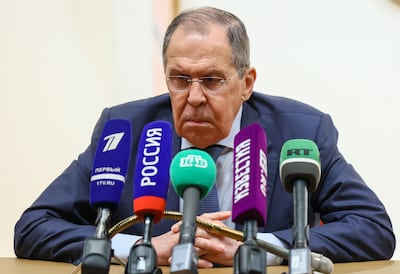Live updates: follow the latest news on Russia-Ukraine
Russian Foreign Minister Sergey Lavrov is to travel to Turkey on Wednesday for talks that are expected to focus on establishing a mechanism to allow Ukraine's grain exports through the Black Sea.
Turkey is involved in efforts by the UN to reach an agreement for the shipment of Ukrainian grain amid an escalating food crisis, following the Russian invasion of Ukraine.
“We are planning to establish a centre in Istanbul to observe the corridor,” Turkish Foreign Minister Mevlut Cavusoglu told the state Anadolu Agency.
Russia's invasion has threatened food security for “millions”, said Caitlin Welsh, director of the Global Food Security Programme.
“The war has curtailed food exports from Ukraine and Russia, particularly wheat, maize, and sunflower oil, increasing the prices of these commodities; driven up demand for substitute products, including alternative cooking oils; and reduced exports of fertiliser from the Black Sea, shifting the quantity and nature of crops producers plan to grow worldwide,” she told the US House Foreign Affairs Middle East, North Africa, and Global Counterterrorism Subcommittee in May.
Turkey's plans to launch a cross-border offensive in northern Syria against the Syrian Kurdish militia, which Turkey considers a security threat, are also expected to be discussed during Mr Lavrov's visit.
Russia has backed Syria's government in the 11-year civil war.
Ankara needs Moscow's approval to continue its presence in northern Syria, despite the two supporting opposite sides in the Syrian war.

Turkey has maintained close ties to both Ukraine and Russia.
It has criticised Russia's invasion of Ukraine but has not joined international sanctions against Russia.
Mr Lavrov's meeting also comes as Turkey, a Nato member, has voiced opposition to Sweden and Finland's bid to join the alliance.
Moscow has also objected to the Nordic countries' candidacy, which analysts say may play a role in discussions concerning Syria.
Turkey, which is struggling to cope with a major currency crisis, banks on tourism revenue to help its economy and provide vital foreign exchange, and Russia is Turkey's main tourism market.
Moscow has exploited that situation in the past, stopping flights carrying tourists to Turkey and halting agricultural imports after Ankara downed a Russian military jet deployed in Syria in 2015.
About seven million Russians and 1.6 million Ukrainians visited Turkey in 2019.
Russia is a major source for Turkey's natural gas and is also building the country's first nuclear power plant.
The two countries signed a co-operation agreement in 2010 to build the plant. Construction began in 2018.










